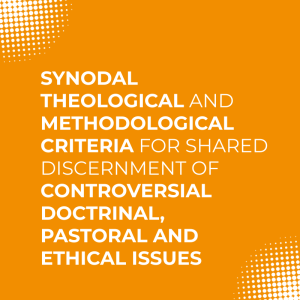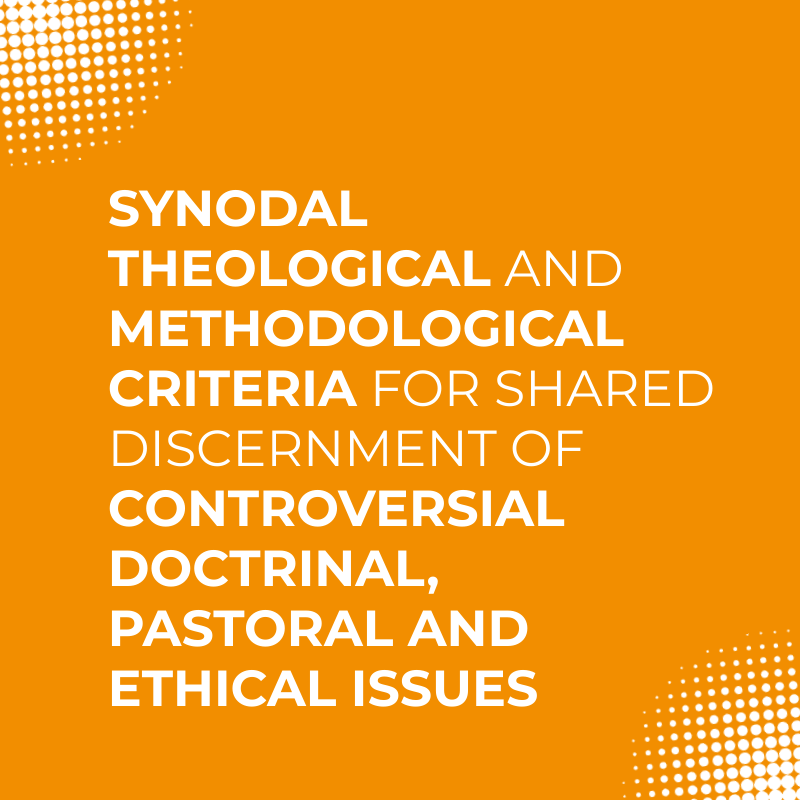The Vatican Synod Office has published a new report which lays out a tentative direction for how the Church can approach LGBTQ+ issues.
 The document is the interim report of the ninth of ten study groups established in 2023 by Pope Francis. Charged with exploring “theological criteria and synodal methodologies for shared discernment on controversial doctrinal, pastoral, and ethical concerns,” the ninth group’s area of study includes the pastoral treatment of LGBTQ+ Catholics. Interim reports from all ten groups were published November 17.
The document is the interim report of the ninth of ten study groups established in 2023 by Pope Francis. Charged with exploring “theological criteria and synodal methodologies for shared discernment on controversial doctrinal, pastoral, and ethical concerns,” the ninth group’s area of study includes the pastoral treatment of LGBTQ+ Catholics. Interim reports from all ten groups were published November 17.
Intended to handle the sensitive issues arising at 2023’s first assembly of the Synod on Synodality, the study groups previously submitted a first report during the 2024 synodal assembly. Subsequent study groups were added by Popes Francis and Leo totaling at present 14 groups. Their final reports — to include concrete proposals — will be submitted to Pope Leo by December 31 “insofar as possible” per his request.
The new interim report contains language which may indicate how LGBTQ+ issues will be discussed in the final report’s recommendations, with some significant departure from previous church descriptions of how LGBTQ+ issues should be considered. For example, the study group identified “homosexuality” as one of three areas classed as “emerging,” rather than “controversial” which is how they were identified in the group’s study charge. The document said that “emerging” was a “more appropriate” label for these issues which also included violence against women in war zones, and the non-violent practice of the Gospel
As an emerging question, homosexuality will receive an interdisciplinary treatment in the final report The document noted the final report will containd a brief presentation “the positions upheld by Tradition and the Magisterium, the (new) questions that have recently emerged, concluding with some questions to be addressed in the discernment process, mentioning the principal references drawn from Scripture and anthropology, including contributions from the scientific disciplines.”
Additionally, the description of the final report’s proposals said they would be “procedural,” and will pay particular attention to “context,” the “management of resistance,”and the “levels of pertinence.”
The interim report said the committee’s work was inspired by the “paradigm shift” called for by Pope Francis, as well as by the Synod’s emphasis on the “practical sphere.” The authors admit that among their challenges in preparing a final report are the “insufficiency of the concepts at our disposal,” the “resistance to changing mental and practical habits”, and the “tensions surrounding the practical means proposed to achieve a shared goal while valuing diversity.”
The document’s only footnote acknowledged Pope Francis’ approach to difficult pastoral issues laid out in section three of Amoris Laetitia, which stated:
“Not all discussions of doctrinal, moral or pastoral issues need to be settled by interventions of the Magisterium. Unity of teaching and practice is certainly necessary in the Church, but this does not preclude various ways of interpreting some aspects of that teaching or drawing certain consequences from it. […] Each country or region, moreover, can seek solutions better suited to its culture and sensitive to its traditions and local needs.”
However, the report also goes beyond Pope Francis’ language regarding the relationship between the doctrinal and the pastoral, reiterating instead the braided and unified relationship between these two spheres. The authors aid that the previous pope’s approach “risks suggesting the existence of separate spheres rather than ones circularly interconnected, thus always mutually implicating one another. Moreover, the relationship between love and truth, under which the issues to be examined are categorized, lends itself to the same misunderstanding, potentially giving rise to the notion that the two terms stand in an inversely proportional relationship.”
The study group mentioned several consultants who were especially involved in its deliberations: Professor Rosalba Manes, Professor Vincenzo Rosito, and Archbishop Filippo Iannone (recently appointed by Leo as his replacement as the Prefect for the Dicastery of Bishops).
Francis DeBernardo, Executive Director of New Ways Ministry, said this interim report was “a breath of fresh air that can help to blow out dusty cobwebs of previous Catholic ways of discussing LGBTQ+ issues.” He hopes “the final report will be as promising in regard to a new discourse around LGBTQ+ pastoral care as this interim report suggests.” DeBernardo added that the discussion on pastoral care in the final report must go beyond simply “homosexuality” to include all people in the LGBTQ+ community.
—Jeromiah Taylor, New Ways Ministry, November 18, 2025
